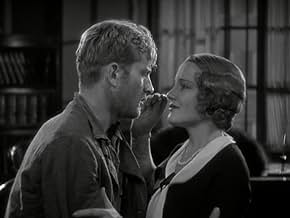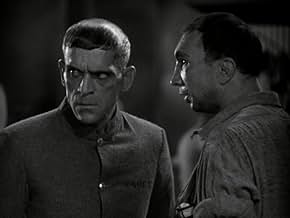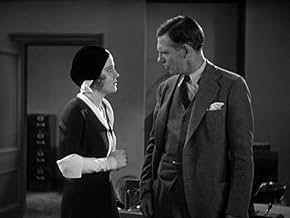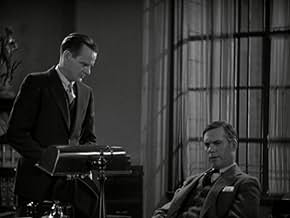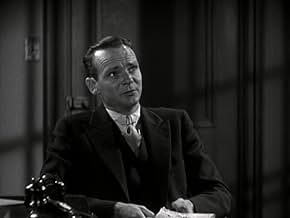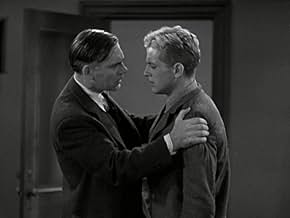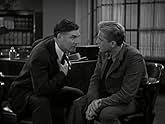AVALIAÇÃO DA IMDb
6,9/10
1,5 mil
SUA AVALIAÇÃO
Após uma tentativa frustrada de concorrer ao governo, o promotor Mark Brady é nomeado diretor da prisão estadual onde muitos dos criminosos que ele processou estão encarcerados.Após uma tentativa frustrada de concorrer ao governo, o promotor Mark Brady é nomeado diretor da prisão estadual onde muitos dos criminosos que ele processou estão encarcerados.Após uma tentativa frustrada de concorrer ao governo, o promotor Mark Brady é nomeado diretor da prisão estadual onde muitos dos criminosos que ele processou estão encarcerados.
- Direção
- Roteiristas
- Artistas
- Indicado a 1 Oscar
- 3 vitórias e 1 indicação no total
DeWitt Jennings
- Captain Gleason
- (as De Witt Jennings)
Paul Porcasi
- Tony Spelvin
- (as Paul Porcassi)
Richard Bishop
- Minor Role
- (não creditado)
Andy Devine
- Cluck - a Convict with knife
- (não creditado)
James Guilfoyle
- Detective Doran
- (não creditado)
Frank Hagney
- Prison Guard in Yard
- (não confirmado)
- (não creditado)
- Direção
- Roteiristas
- Elenco e equipe completos
- Produção, bilheteria e muito mais no IMDbPro
Avaliações em destaque
DA Brady sends young Graham to prison unjustly, and must redeem himself once he becomes the prison's warden.
The credits indicate icon Howard Hawks as the director; IMDb uncharacteristically lists no one; while Hawks' bio-site states he's the uncredited helmsman. I include this rather puzzling movie pedigree because I see very little of Hawks' characteristic style on screen. He may well have been adjusting to the new factor of sound (as others point out), but whatever the reason, the screenplay could have been filmed by any number of solid Hollywood craftsmen.
The movie itself has been made several times over, so the material is familiar. But except for Huston's dynamic performance and Karloff's formidable presence, there's not much to recommend beyond the story itself. The prison yard scenes are riveting with their marching phalanxes of inmates. Sort of like a non-musical Busby Berkeley. I also like that early scene where DA Brady (Huston) strips away shady lady Gertie's thin façade of respectability. To me, its spirited air bespeaks Hawks' guiding hand, as does Brady's surprisingly intense grilling of Graham. However, what should be a highlight, Ned's (Karloff) revenge killing of the squealer, is unnecessarily down-played for this pre-Code period.
Note how we're led to respect the inmates' code of conduct even though they are convicted criminals. Both the law and the inmates have their respective codes, but more importantly, the codes may well be linked by a common sense of justice. When, for example, those codes are broken by the squealer, on one hand, and by head guard Gleason, on the other, we're led to sympathize with the respective acts of retribution, bloody though they undoubtedly are. And since both acts are carried out by the hulking Ned, he becomes something of an avenging angel despite his gruesome appearance. It's the ambiguities of the two codes, united, perhaps, by a common sense of justice that suggests an interesting subtext to the story.
Anyway, in my little book, this is a Walter Huston showcase, proving again that an actor of less than handsome appearance could carry a Hollywood movie.
The credits indicate icon Howard Hawks as the director; IMDb uncharacteristically lists no one; while Hawks' bio-site states he's the uncredited helmsman. I include this rather puzzling movie pedigree because I see very little of Hawks' characteristic style on screen. He may well have been adjusting to the new factor of sound (as others point out), but whatever the reason, the screenplay could have been filmed by any number of solid Hollywood craftsmen.
The movie itself has been made several times over, so the material is familiar. But except for Huston's dynamic performance and Karloff's formidable presence, there's not much to recommend beyond the story itself. The prison yard scenes are riveting with their marching phalanxes of inmates. Sort of like a non-musical Busby Berkeley. I also like that early scene where DA Brady (Huston) strips away shady lady Gertie's thin façade of respectability. To me, its spirited air bespeaks Hawks' guiding hand, as does Brady's surprisingly intense grilling of Graham. However, what should be a highlight, Ned's (Karloff) revenge killing of the squealer, is unnecessarily down-played for this pre-Code period.
Note how we're led to respect the inmates' code of conduct even though they are convicted criminals. Both the law and the inmates have their respective codes, but more importantly, the codes may well be linked by a common sense of justice. When, for example, those codes are broken by the squealer, on one hand, and by head guard Gleason, on the other, we're led to sympathize with the respective acts of retribution, bloody though they undoubtedly are. And since both acts are carried out by the hulking Ned, he becomes something of an avenging angel despite his gruesome appearance. It's the ambiguities of the two codes, united, perhaps, by a common sense of justice that suggests an interesting subtext to the story.
Anyway, in my little book, this is a Walter Huston showcase, proving again that an actor of less than handsome appearance could carry a Hollywood movie.
10whpratt1
Boris Karloff appeared on the stage of the Belasco Theatre, New York City in the role of Galloway in a Martin Flavin stage play. It was a minor part, however, it was an important one: Galloway, the prison trusty who becomes a killer. On the strength of his performance, he was soon cast in the film version. During 1931-32, twenty-three of his films were released, an average of nearly one a month which included Frankenstein. Criminal Code was the big break Karloff was waiting for and he never gave up acting until the very end.
"The Criminal Code" is centered around the theme "An Eye for An Eye." This theme is the reason that young Robert Graham is sent to prison, the reason why the prisoners object to the D.A. becoming the Warden of the prison, and the reason why Graham is sent to "the hole" near the end of the film. For 1931, it was one of the first critical looks at this theme. It raises certain questions as to the morals of the law, and the Criminal Code versus the Prisoners Code. Phillips Holmes gives a good enough performance as Robert Graham, and Boris Karloff came off well as the inmate with a bone to pick (months before becoming Frankenstein), but the performance that I liked the most was Walter Huston, who played the D.A.-turned-prison-warden. Huston's character was a wily one, who said "Yeah" and "Yeah?" about a hundred times throughout the film.
Sometimes you seem to get into a position where you have to take your medicine for an even unintended actions. That is what happens to poor 20-year-old Bob Graham, and within 10 minutes into the movie, he's in the infinite world of prison, where he must learn yet another set of codes of the criminal sort. Creepy Ned Galloway (Boris Karloff just before his "Frankenstein" turn) takes a rather minor (at least early on) role and fills it with gusto (maybe its that creepy little haircut) in a claustrophobic cell. Later, he does the right thing for rehabilitated and soon-to-be-paroled (maybe) Graham, who does not violate the titular Criminal Code (since he's still a con).
James Whale wanted Karloff for his monster after seeing Boris in this flick, and after you see it, you'll know why.
BTW, who doesn't love a good prison movie yarn, and with Karloff in it, it rates a "9."
James Whale wanted Karloff for his monster after seeing Boris in this flick, and after you see it, you'll know why.
BTW, who doesn't love a good prison movie yarn, and with Karloff in it, it rates a "9."
The lessons unlearned belong to Walter Huston's character, Mark Brady, but I'll get to that later.
Philip Holmes plays Robert Graham, a young man of twenty who gets into an altercation in a dance hall and ends up killing the other guy, someone he's never even met before. D.A. Mark Brady is not a man without compassion. He even states how, were he the defense attorney, he would get the boy off without serving a day. As a result, he sends him up for manslaughter rather than murder. However, that is still ten years, and six years into the sentence Graham is a man who is losing hope and his sanity.
In an odd twist of fate D.A. Mark Brady becomes warden of the prison, a place inhabited by many of the men he helped convict. The prison doctor comes to Brady with a request - let Graham be Brady's private driver for awhile, to get him out of the prison factory. Brady agrees. A few short months later and Graham is beginning to have a new lease in life. Plus, there is a complication - he is falling in love with Brady's daughter. However, an event soon occurs at the prison that threatens Graham's hope for a better future.
As for the lessons unlearned, the one quirky thing about this film is how D.A. turned prison warden Brady keeps saying "you've go to take things how they break", never realizing that in many cases - exhibit A being the case of inmate Robert Graham - Brady is in total control of how things break, in particular the fact that Robert Graham, a basically square kid, is an inmate in the first place. However, at least Brady is not a hypocrite, since he seems to be willing to take the good with the bad in his own life as well. A pretty complex character for an early 30's film.
Of course all classic movie fans are familiar with Walter Huston and his many abilities and roles. However, most people will not have heard of Philip Holmes. Partly this is because his early successes in film did not lead to better things as the 1930's progressed, and the rest of the reason is that many of his early successes occurred at Paramount, whose early films have been largely unseen for decades. This is worth checking out. The screenplay was nominated for an Oscar, and the performances are quite good.
Philip Holmes plays Robert Graham, a young man of twenty who gets into an altercation in a dance hall and ends up killing the other guy, someone he's never even met before. D.A. Mark Brady is not a man without compassion. He even states how, were he the defense attorney, he would get the boy off without serving a day. As a result, he sends him up for manslaughter rather than murder. However, that is still ten years, and six years into the sentence Graham is a man who is losing hope and his sanity.
In an odd twist of fate D.A. Mark Brady becomes warden of the prison, a place inhabited by many of the men he helped convict. The prison doctor comes to Brady with a request - let Graham be Brady's private driver for awhile, to get him out of the prison factory. Brady agrees. A few short months later and Graham is beginning to have a new lease in life. Plus, there is a complication - he is falling in love with Brady's daughter. However, an event soon occurs at the prison that threatens Graham's hope for a better future.
As for the lessons unlearned, the one quirky thing about this film is how D.A. turned prison warden Brady keeps saying "you've go to take things how they break", never realizing that in many cases - exhibit A being the case of inmate Robert Graham - Brady is in total control of how things break, in particular the fact that Robert Graham, a basically square kid, is an inmate in the first place. However, at least Brady is not a hypocrite, since he seems to be willing to take the good with the bad in his own life as well. A pretty complex character for an early 30's film.
Of course all classic movie fans are familiar with Walter Huston and his many abilities and roles. However, most people will not have heard of Philip Holmes. Partly this is because his early successes in film did not lead to better things as the 1930's progressed, and the rest of the reason is that many of his early successes occurred at Paramount, whose early films have been largely unseen for decades. This is worth checking out. The screenplay was nominated for an Oscar, and the performances are quite good.
Você sabia?
- CuriosidadesThe prison yard sequence was shot at M-G-M, using the set originally built for "The Big House" (1930).
- Erros de gravaçãoPaul Porcasi's name is spelled "Porcassi" in the opening credits.
- Citações
Mark Brady: [to Graham] Tough luck, Bob, but that's the way they break sometimes. You got to take them the way they fall.
- Cenas durante ou pós-créditosThe film's credits do not say that Howard Hawks directed the film; instead, they say that the film is "A Howard Hawks Production."
- ConexõesAlternate-language version of El código penal (1931)
Principais escolhas
Faça login para avaliar e ver a lista de recomendações personalizadas
- How long is The Criminal Code?Fornecido pela Alexa
Detalhes
- Data de lançamento
- País de origem
- Idioma
- Também conhecido como
- The Criminal Code
- Locações de filme
- Empresa de produção
- Consulte mais créditos da empresa na IMDbPro
- Tempo de duração
- 1 h 37 min(97 min)
- Cor
Contribua para esta página
Sugerir uma alteração ou adicionar conteúdo ausente

